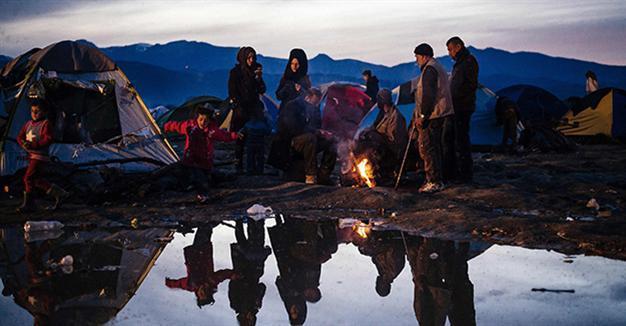Don’t sacrifice Turkey-EU bond for sake of refugee deal: İKV
ISTANBUL

A family sits around a bonfire at the makeshift camp of the Greek-Macedonian border, near the village of Idomeni, on March 8, 2016, where thousands of refugees and migrants are trapped by the Balkans border blockade. AFP Photo
Turkey and the European Union should not sacrifice the long-term relationship they have constructed over the years simply to find a mutually convenient solution to the refugee crisis, the chairman of the Economic Development Foundation (İKV) has said.
“It is important for Turkey and the EU not to sacrifice their long-term relationship while seeking an urgent solution to the refugee crisis,” said Ayhan Zeytinoğlu, chairman of İKV, said March 9.
The chairman said Turkish Prime Minister Ahmet Davutoğlu had surprised everyone when he submitted new demands and proposals to EU leaders at an EU-Turkey summit on March 7.
Regarding the clause to resettle one Syrian from Turkey in EU member states for every Syrian readmitted by Turkey from Greece, Zeytinoğlu said Syrian nationals had the right to protection as individuals who have fled war, making the accommodation of Syrian nationals in EU countries a reality of international law.
“Furthermore, one should recall that the quota of 160,000 people with respect to Syrian refugees has still not been shared among EU countries,” said Zeytinoğlu, while noting the reluctance of many EU countries to accommodate Syrian refugees currently living in Turkish camps.
EU realities to be taken into account “In that situation, it is critical for Turkey to tread carefully by taking into account the EU’s realities,” he said.
Welcoming the prospect that a visa liberalization process for Turkish citizens would be moved forward to the end of June instead of October, Zeytinoğlu said all related parties needed to work rapidly to meet the objectives of reaching this aim.
“Nonetheless, one should note that even if visa-free travel did materialize for Turkish citizens, there is always a risk of being turned back at EU member states’ crossing points,” he warned. “Therefore, the Turkish public should be informed of these possibilities.”
During the summit, Turkey demanded an extra 3 billion euros by the end of 2018 in addition to the 3 billion euros that the EU has already pledged to the country to improve living conditions for Syrian migrants in Turkey.
Additional funds ‘not bargaining but burden-sharing’
Zeytinoğlu said the request for supplemental funds should not be interpreted as bargaining but “should be considered more from the perspective of burden-sharing with the EU.”
“From that perspective, it is of utmost importance for such funds to be maintained and implemented in the context of strong and effective cooperation between Turkey and the EU,” he said.
Stating that Turkey’s request to reinvigorate the EU accession process was a fair one, Zeytinoğlu said a continuing veto imposed by Greek Cyprus must be lifted.
“In order to create a positive impetus in the accession negotiations by virtue of the rapprochement between the parties on the refugee crisis, Turkey should accelerate its reform process and take into account EU standards, especially on issues regarding the independence of the judiciary and freedom of expression and of the press,” he said.
